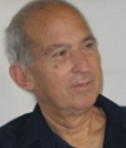Description: Eric Moss, Ph.D. will speak on group psychotherapy with Israeli civilians who have lost family members to random acts of terrorism. In Israel the scope of this problem is enormous: the numbers of victims has grown to the thousands. Citizens, going about their daily life in public places such as markets, buses, shopping centers, wedding halls, and night clubs are at risk of suicide bomb attacks. These traumatic events have a deleterious effect on Israeli society and on the family members of victims of indiscriminate attacks. Dr. Moss has been central in Israel in providing and supervising psychotherapy groups for bereaved parents, children, spouses, and siblings; and recently a group has been added that includes both Jews and Arabs, which signifies the universality of such loss, even in such a highly divisive political climate. Evidence shows that these groups have been extremely helpful in helping family members face and learn to live with the terrible trauma they have experienced. Dr. Moss will share techniques and insights gained through his clinical work.

Trainer: Eric Moss, a clinical psychologist and group analyst in Israel, has worked for the past ten years as a consultant to the National Insurance Agency on all aspects of terror-related bereavement, and has been central in setting up, facilitating, and overseeing multiple bereavement groups. Currently there are some 15 groups, each consisting of 10-12 participants who have a family member who has been killed or maimed in a suicide bomb attack. Dr. Moss is a certified psychologist clinical psychologist in Israel, and his overall professional orientation is psychodynamic. He received his doctorate in rehabilitation counseling from New York University and psychoana
lytic training from the Psychoanalytically-Oriented Psychotherapy Program at the Israel Psychoanalytic Institute in Jerusalem. He is a graduate of the Israeli Institute for Group Analysis in Tel Aviv. Dr. Moss has published 22 articles in the fields of psychiatry and individual and group psychotherapy.
Clinical Lecture Series at the University of North Carolina at Chapel Hill School of Social Work